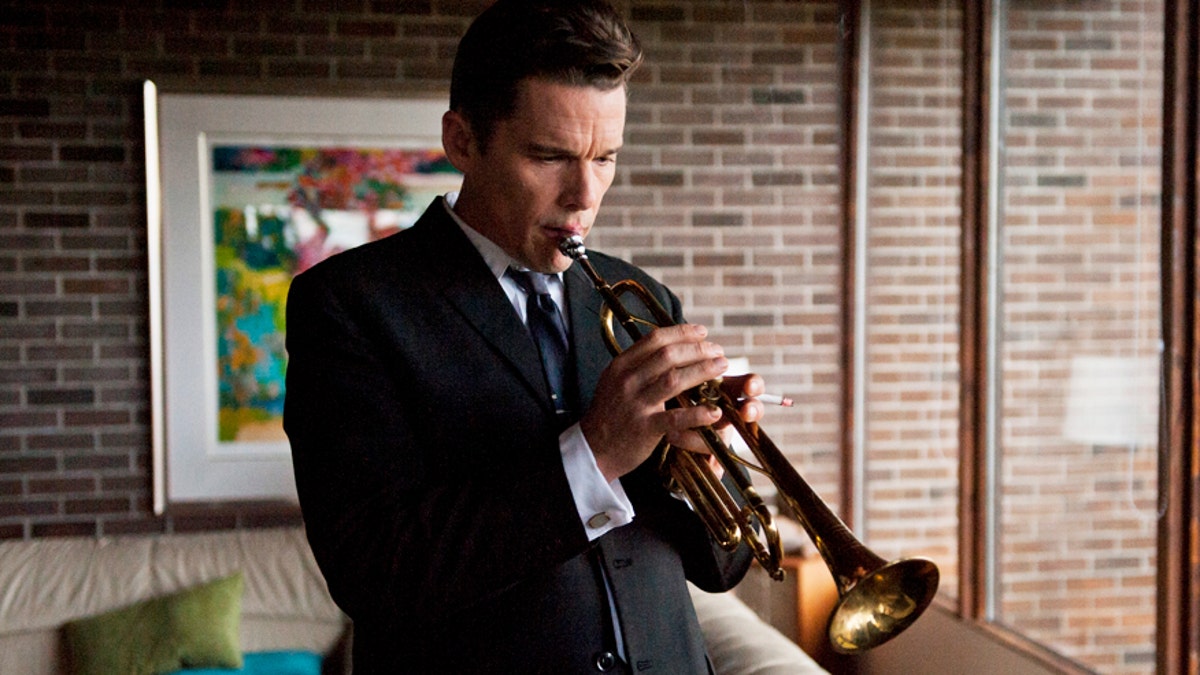
Ethan Hawke plays Chet Baker in Robert Budreau’s, "Born to Be Blue." Courtesy of Caitlin Cronenberg. An IFC Films release
LOS ANGELES – Chet Baker was a man with a horn and he definitely knew how to blow it. Now his story is captured on film with Ethan Hawke starring as the legendary jazz trumpeter in IFC Films' "Born to be Blue."
In the 1950s, Baker was one of the most famous trumpeters in the world, but hard living and a heroin addiction brought him low. "Born to Be Blue" picks up at a key moment in Baker's life in the '60s as he fights to make a comeback with help from a new woman in his life (Carmen Ejogo).
"I think sometimes when movies try to bite off too much and tell too big of a story about a life, you can get lost," Hawke told FOX411 when asked why the makers of "Born to Be Blue" have asked that it not be described as a "biopic." "Real lives are so rich and so much more complicated than you can really do in a two-hour movie. So this really is just a beautiful part of his story."
One remarkable slice of Baker's life took place during his struggle to regain his footing in the jazz world. He was badly beaten, so much so that he lost his front teeth. When he got out of the hospital and was fitted with replacements, he was told that he would never play again, but Baker wouldn't accept that. Music was his life.
Whether or not the version of the incident as shown in the movie is the true story, Hawke admits he doesn't know for sure. But he feels it is the honest answer. "Chet told so many different versions of it, but the rumor mill has a pretty good case to be made that he robbed his dealer and his dealer was pretty pissed off."
The filmmakers then follow Baker's effort to relearn the trumpet, which meant that they couldn't incorporate original tracks laid down by the trumpeter. The playing at that point needed to be uneven to reflect the rebirth of his talent, so they hired Kevin Turcotte, who using his skill could play poorly when needed, and then more sophisticatedly as Baker got his mojo back.
"I think what we tried to do is not get into imitation," Hawke says. "We wanted to capture the mood and the energy and avoid literal imitation because if you're going to do that, you may as well just see the documentary [‘Let's Get Lost’ directed by Bruce Weber]."
It wasn't just in the music that the desire was present to capture the essence of Baker. It was also in the performance. To do so, Hawke had to address the demons that drove the jazz man, but he found that the answer wasn't simplistic.
"I remember once a long time ago, I got to work with Robin Williams," Hawke says. "He used to say that he thought cocaine made him funny. The truth is that he was funny despite the cocaine. It's a challenge for all of us to find the right way and the healthy to handle our fear, anxiety and pain. There's a reason why drugs and alcohol are so prevalent in our life."
The issue of race is also addressed in "Born to Be Blue" because even though Baker was a pioneer as part of the West Coast jazz scene, jazz was developed as a part of the African American culture.
"This is a white man in love with black culture," Hawke says. "Like Eminem or Elvis Presley after him, he was smart enough to know a great thing when he heard it. It was never lost on him that he was riding the coattails of Miles Davis, Dizzy Gillespie, Louie Armstrong and Cliff Brown."
Baker's talent was not to be denied. Plus, as a white man, he was easier for the record companies to market. Hawke says, "I don't really blame Chet or Eminem for that. That's society's problem. I think these artists genuinely had the same love of the music that a lot of people did -- black or white."
“Born to Be Blue” is currently in theaters.














































